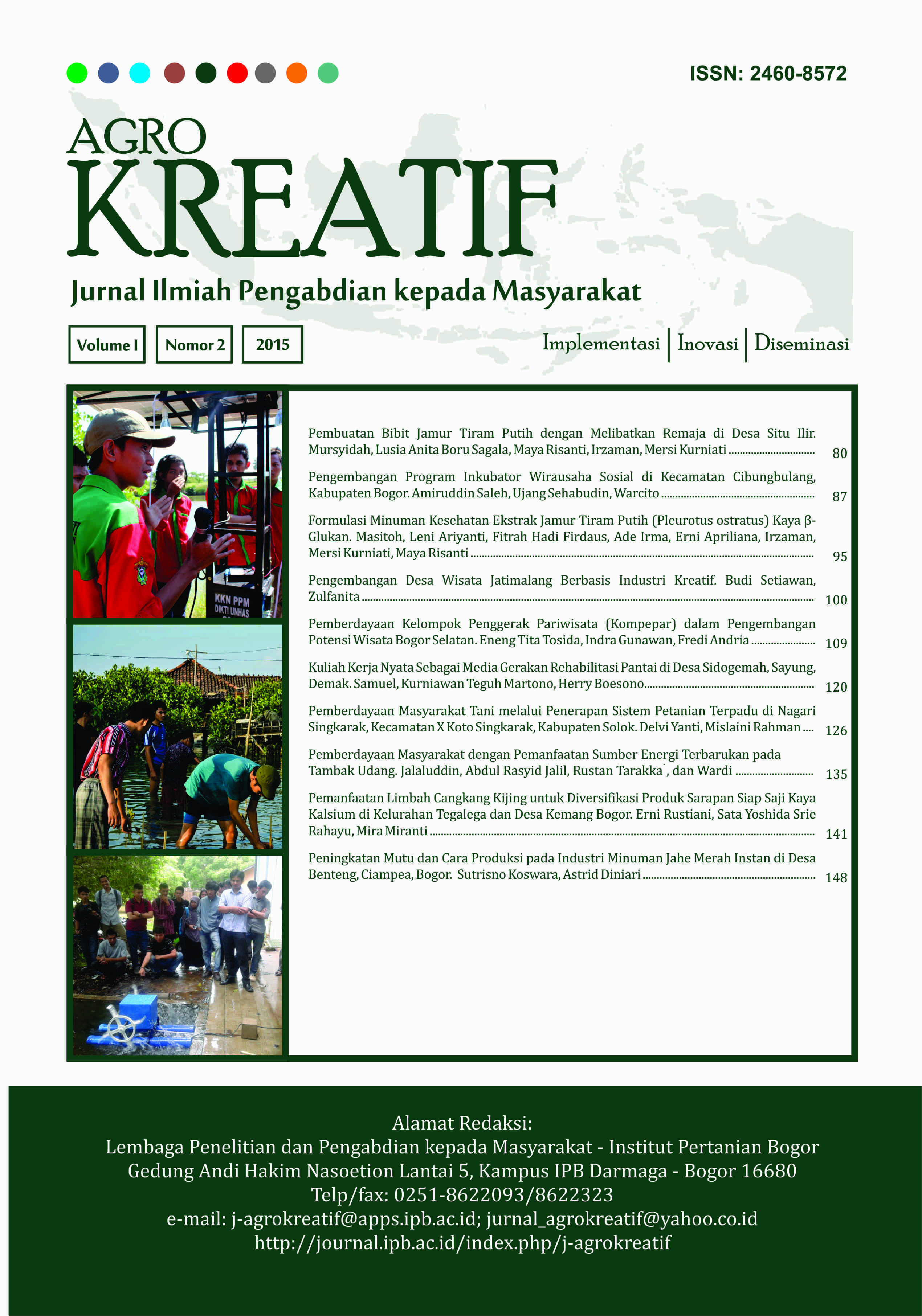Peningkatan Mutu dan Cara Produksi pada Industri Minuman Jahe Merah Instan di Desa Benteng, Ciampea, Bogor
Abstract
Red ginger (Zingiber officinale var. Rubrum) have been processed into several foods and beverages, such as instant beverage, ginger candy, ginger pickle, ginger coffee, etc. This study aimed to study the optimum formulation of red ginger instant drinks and the most effective comparison of solubility with water, implement food security at household industry, and examine the financial aspects in the industrial of red ginger instant drinks at Benteng Village, Ciampea, Bogor. On determining the best formula, tested on 3 formula: formula with ratio sugar and red ginger 1:2 (A), 1:1 (B), and 1:3 (C). The yield of each formula was different which 66.33% ( formula A), 42.67% (formula B), and 69.33% (formula C). The best formula chosen is C because the materials used for the manufacture of the most economical and fast rehydration time. After following several processed of certification, the household industry of Jahe Gunung Leutik got the PIRT number as follow 61232010110099. Feasibility analysis also showed that the domestic industry was declared worthy of financial side. Based on the result of cost calculation of production of instant drink obtained that Rp 4.735.71. The result of instant drinks red ginger feasibility are NPV = Rp 917.725.03, gross B/C = 1.8244, net B/C = 3.8910, and IRR= 53%.Downloads
References
Ali BH, Blunden G, Tanira MO, Nemmar A. 2008. Some phytochemical, pharmacological dan toxicological properties of ginger (Zingiber officinale Roscoe): A review of recent research. Food and Chemical Toxicology. 46(2): 409-420.
Antara NT. 1997. Aplikasi teknik kokristalisasi dalam pengembangan produk minuman sehat. Prosiding Seminar Teknologi Pangan. 323-333.
BPOM (Badan Pengawas Obat dan Makanan). 2003. Pedoman Sertifikasi Produk Pangan Industri Rumah Tangga. Jakarta (ID): BPOM RI.
Bennion M, Scheule B. 2004. Introductory Foods. Mishawaka (US): Prentice Hall.
Earle RL. 1969. Satuan Operasi dalam Pengolahan Pangan (Terjemahan Nasution MZ). Jakarta (ID): Sastra Hudaya.
Ibrahim H, Awang K, Ali NAM, Malek SNA, Jantan, Syamsir DR. 2008. Selected Malaysian aromatic plants and their essential oil components. Malaysia (MY): University of Malaya.
Koswara S. 1995. Jahe dan Hasil Olahannya. Jakarta (ID): Pustaka Sinar Harapan.
Kusnandar F, Syah D, Hariyadi P, Budijanto S. 2009. Penuntun Praktikum Terpadu Pengolahan Pangan. Bogor (ID): Institut Pertanian Bogor.
Larsen K, Ibrahim H, Khaw SH, Saw LG. 1999. Ginger of Peninsular Malaysia and Singapore. Kota Kinabalu: Natural History publications (Borneo); 135pp.
Meilgaard M, Civille GV, dan Carr BT. 1999. Sensory Evaluation Techniques 3rd Edition. Boca Raton (US): CRC Press.
Nielsen SS. 2003. Food Analysis. New York (US): Kluwer Academic/Plenum Publisher.
Nurmalina N, Sarianti T, Karyadi A. 2009. Studi Kelayakan Bisnis. Bogor (ID): Institut Pertanian Bogor.
Sabulal B, Dan M, John AJ, Kurup R, Pradeep NS, Valsamma K. 2006. Caryophyllene-rich rhizome of Zingiber nimmoni from South India: Chemical characterization and antimicrobial activity. Phytochemistry. 67 (22): 2469-2473.
This work is licensed under a Creative Commons Attribution-NonCommercial 4.0 International License.



















